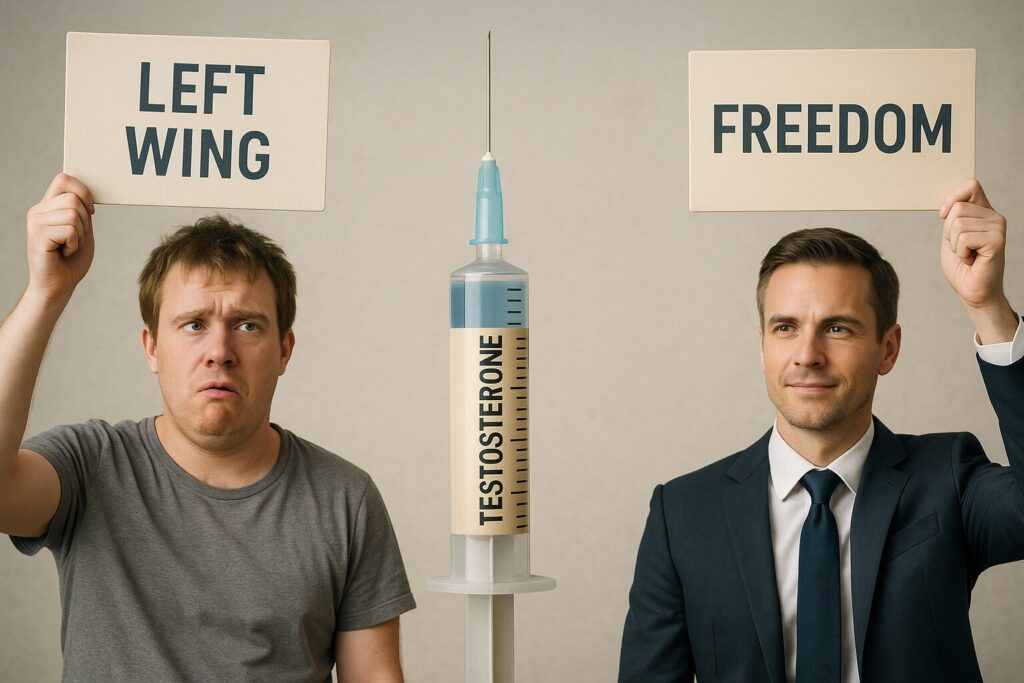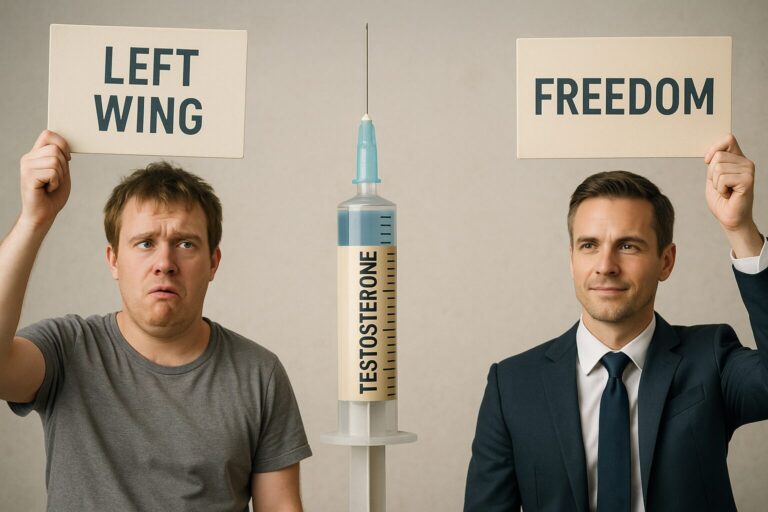
A recent peer-reviewed study published in Brain and Behavior has shaken the academic and political world. The research tested whether the administration of testosterone could influence political preferences. The findings are not only surprising but also raise profound questions about the nature of political identity and freedom.
The experiment involved 136 healthy male participants who received either synthetic testosterone or a placebo. Their political preferences were measured before and after the treatment. This controlled design provided researchers with a rare opportunity to observe the direct impact of a hormone on ideology.
What emerged was a striking result: weakly affiliated Democrats shifted their political attitudes significantly after testosterone administration. Their loyalty to the Democratic Party fell by 12%, and their reported warmth toward Republican presidential candidates skyrocketed by 45%.
By contrast, strong Democrats, Republicans (both strong and weak), and independents did not show such changes. This selective effect indicates that testosterone influences those with less rigid partisan attachments, creating what the authors call a “red shift.”
The metaphor of a “red shift,” borrowed from physics, describes a movement toward the right end of the political spectrum. Politically, it represents a drift from left-leaning positions toward conservative preferences.
Before the treatment even began, researchers noticed that weakly affiliated Democrats had 19% higher baseline testosterone than their strongly affiliated counterparts. This suggests a biological predisposition that may explain why some Democrats lean right under pressure or changing conditions.
Testosterone has long been associated with dominance, risk-taking, competition, and aggression—traits often linked to conservative or right-leaning values. By enhancing these tendencies, the hormone appears to push individuals toward ideologies that emphasize strength, independence, and resistance to redistribution.
Interestingly, Republicans displayed no significant differences in testosterone between strong and weak affiliations. This suggests that conservative identity is more stable and less affected by hormonal fluctuations, rooted instead in consistent principles and cultural reinforcement.

The implications of these findings are profound. Political consultants spend millions on advertising and campaigning, but this research suggests that biology itself may be a stronger driver of political preference than any carefully crafted message.
Testosterone, sometimes called the “hormone of competition and autonomy”, seems to reduce the appeal of leftist dependency-driven policies while increasing the attractiveness of conservative leadership that embodies strength and decisiveness.
This resonates with broader global political shifts. The rise of right-leaning and populist leaders in the United States, Europe, and beyond may partially reflect biological responses to stress, competition, and insecurity.
Economic crises, uncontrolled immigration, and inflation create stress in populations. Stress, in turn, can elevate testosterone. This chain reaction might explain why previously left-leaning individuals reconsider their political loyalties in times of crisis.
The study also highlights the role of single men in modern politics. Single males, with higher testosterone levels, are more competitive and risk-prone, making them more likely to abandon collectivist ideologies in favor of movements that emphasize individual strength and freedom.
This means that the political battlefield is not purely ideological—it is also biological. Campaigns that trigger emotional and hormonal responses may have greater influence than traditional debates or rational arguments.
Swing voters, already recognized as decisive in elections, emerge in this study as biologically more susceptible to hormonal nudges. Testosterone can literally shift electoral outcomes, something no strategist can ignore.
Of course, the researchers acknowledge the limitations of their work. The sample was composed largely of young college students, and Republicans were underrepresented. Future studies should include older adults and women to expand the scope of understanding.
Nevertheless, the implications are groundbreaking. Politics, once seen exclusively as a realm of ideology and rational choice, now intersects with neuroscience and endocrinology. The human brain and body play roles that go far beyond cultural conditioning.
For advocates of freedom, this raises critical questions. Are our political convictions truly rational, or are they influenced by forces beyond our conscious control? If hormones can shape ideology, then defending liberty requires not only intellectual debate but also cultural environments that reinforce independence and strength.
One possible interpretation is that freedom aligns naturally with biology. Testosterone encourages autonomy, competitiveness, and resilience—traits essential to resisting authoritarianism and collectivist ideologies.
Conversely, efforts to suppress masculinity, stigmatize competitiveness, and encourage dependency may serve as tools of control. By undermining traits associated with testosterone, collectivist ideologies weaken individuals, making populations more docile.
The research challenges the myth that political identity is fixed for life. While strongly affiliated partisans resist change, weaker affiliations are biologically flexible and can shift with circumstances that alter hormonal states.
Thus, testosterone becomes not just a hormone of strength, but a hormone of freedom. It reduces blind loyalty, increases skepticism of collectivist promises, and amplifies the courage to embrace independence.
The authors are careful to note that testosterone does not “turn Democrats into Republicans.” Instead, it nudges those already predisposed to flexibility toward conservative alignment. This subtlety underscores the need for caution, but it also confirms the biological reality of ideological shifts.
At a deeper level, the findings suggest that the fight for liberty is not only philosophical—it is also a struggle for human nature itself. Biology resists control, and freedom may be written into the very structure of our physiology.
This resonates with cultural history. Societies that embrace strength, responsibility, and independence tend to prosper and defend liberty, while those that suppress these traits succumb to authoritarianism.
In the end, the data remind us of a fundamental truth: biology matters in politics. And if liberty aligns with our natural drives, then defending it is not only a matter of principle but a biological necessity.
For the DEFENSE Institute, this study reinforces the conviction that freedom must be defended on every front—legal, cultural, educational, and yes, even biological.
The research concludes with a challenge: read the full article, reflect on its implications, and recognize that the defense of liberty is not only an intellectual pursuit but one deeply tied to our human essence.
📖 Reference:
Alogaily, R., Zahedzadeh, G., Pyle, K. V., Johnson, C. J., & Zak, P. J. (2025). Testosterone Administration Induces a Red Shift in Democrats. Brain and Behavior, 15:e70651. https://doi.org/10.1002/brb3.70651







